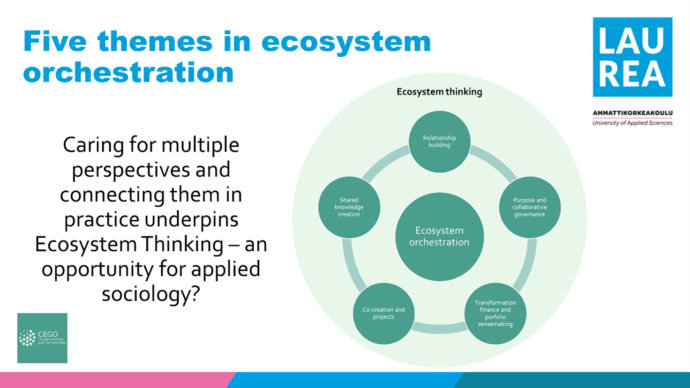In order to increase its relevance in applied settings, the discipline of sociology should be able to create knowledge that can support practice. Could ecosystems orchestration be one area of building this relevance? This is a open-ended question and challenge I posed in my presentation at the Annual Sociology Conference 2023 which is the basis of this article.
 Phto: jplenio / Pixabay
Phto: jplenio / Pixabay
The main traditions and strengths of the scientific discipline of sociology have focused on exploring multiple perspectives using quantitative and qualitative methods (Abbott 2000). Sociological practice, interventions and fostering social change have not been widely adopted in sociology (Bruhn & Rebach 2007). If the discipline focuses only on its own area of research, its relevance in applied real-world contexts is lacking. From the perspective of universities of applied sciences, this reduces the applicability of sociology.
Given the global, societal and systemic challenges we face today, the linear orientation of solving the problems is not up to the task whereas the actual work is transforming the actors and the patterns of interaction that govern their activities (Seppälä 2021). Economists and designers are taking increasingly larger roles in the development of society and tackling societal challenges. How could sociology be renewed to be more relevant in applied settings?
Beyond disciplines?
In his book Chaos of Disciplines Andrew Abbott (2001), the professor of the sociology of knowledge at the University of Chicago, makes the case that sociology is not necessarily making progress. According to him disciplines do borrow from each other but because scholars are educated in their disciplinary linages, new approaches to study issues and phenomena are adopted (Abbott 2001, 153). However, because the disciplines and their findings are not brought together, knowledge beyond the perspectives of single disciplines is not created (Abbott 2001, 230-231).
We need multi- (many disciplines), inter- (between disciplines) and transdisciplinary (creating knowledge using synergies beyond the individual disciplines) approaches such as complex systems science to help bridge the disciplines. What is particularly useful in the discipline is thinking of properties, phenomena or issues as emergent results of evolutionary networks and their structures.
Habermas’ idea of three worlds, the external world, the social world and the internal world are the foci of different disciplines. Gerald Midgley (2000) builds Habermas’ idea by critiquing it from the perspective that we should shift beyond the subject/object dualism (f.ex. separation of self and science) towards an integration of the subject, object and language and the processes by which they influence each other. These different elements are in relation to and influence each other and affect how the elements are constituted. Processes such as this are highly indeterminant and give rise to uncertainty and require us to shift from content to process philosophies. The question I would like to pose is what types of research methodologies could we use in sociology to explore ever-changing settings?
Perhaps the methodologies should be informed by an alternative perspective on the philosophy of science. To do this Gerald De Zeeuw outlines three phases in science. The first phase underpinning modernity takes the perspective of an immaterial observer that seeks to create knowledge about the objective reality. The second phase of science reflecting postmodernity adds the perspectives of subjective reality explored through individual and collective observers. De Zeeuw’s third phase combines the two earlier phases and seeks to understand how the objective reality is constituted in relationships of plural subjective actors. (Bausche 2014.)
This type of science is required for real-world contexts such as challenges related to sustainability.
Ecosystems orchestration as an opportunity for sociology
Sustainable development cannot be achieved by a single organisation and thus the concept of ecosystems has risen in popularity in the last years to deal with challenges that require sustained collaboration between multiple organisations.
One definition of ecosystems from the management discipline is that they are social, co-evolving ecosystems where the different actors influence and are influenced by their shared environments, situations and institutional settings (Peltoniemi 2004). Ecosystems orchestration refers to the activities that go into fostering collaboration between organizations and actors within and between ecosystems (Valkokari et al. 2021).
Engaging with and building bridges between multiple perspectives and conflicting logics of value creation is at the heart of ecosystems orchestration. This requires a focus on building relationships between different actors where caring is the foundation of collaboration (Dhami 2021). Caring which requires capacities to understand and bring together multiple perspective is one of the foundational elements of ecosystem thinking.
What are the themes in ecosystems orchestration where ecosystem thinking can be employed? Based on a recent review of international ecosystems orchestration practitioners in sustainability, five themes of approaches emerged. They include (1) relationship building, (2) identifying shared challenges and collaborative governance, (3) hybrid funding and portfolio management, (4) co-creation and project management, and (5) creation shared knowledge. (CEGO 2022.) As this article focuses on posing the question and challenge to sociology on how the discipline might contribute to ecosystems orchestration, I will not elaborate on these themes here. In the CEGO (2022) – Circular Economy Goes East and West -project we organized workshops and webinars where these broad topics in themselves were explored further (in Finnish) and these materials can be found online.
 Five themes in ecosystems orchestration (CEGO 2022).
Five themes in ecosystems orchestration (CEGO 2022).
Sociology has a proven history in exploring multiple perspectives however it has not yet shifted into the third science space where it might be connected to other disciplines to influence real-world settings. The open-ended question and challenge to sociology is how it might better integrate and contribute to societal ecosystems, processes and orchestration activities.
This article is a summary of the author’s talk at the Finnish Annual Sociological Conference 2023 in Tampere. The recording and slides of the conference talk can be found online.
Author:
Mikael Seppälä works at the Laurea University of Applied Sciences as a project manager on mainly regional development projects, where an understanding of innovation management and ecosystems is of benefit. He also co-ordinates the development of Laurea’s capacities in innovation management and ecosystems.
Sources:
- Abbott, A. 2001. Chaos of Disciplines. USA: The University of Chicago Press.
- Bausche, K.C. 2014. The Theory and Practice of Third Phase Science. In Metcalf, G.S. (ed.). 2014. Social Systems and Design. Springer: Japan. pp. 129-145.
- Bruhn, J.G. & Rebach, H.M. 2007. Sociological Practice. Intervention and Social Change. USA: Springer.
- CEGO. 2022. Jaettujen haasteiden kimppuun vastuullisuuden ekosysteemeissä.
- Dhami, A. 2021. Organising #BeyondtheRules at Dark Matter Labs 3/4: Distributed Agency, Distributed Care.
- Midgley, G. 2000. Systemic Intervention: Philosophy, Methodology, and Practice. Springer Science+Business Media: New York.
- Peltoniemi, M. 2004. Cluster, Value Network and Business Ecosystem: Knowledge and Innovation Approach. NEXSUS Conference paper.
- Seppälä, M. 2021. Radical uncertainty requires radical collaboration. Stepping stones towards systems transformation with innovation portfolios. Sitra memorandum.
- Valkokari, K., Hyytinen, K., Kutinlahti, P., & Hjelt, M. 2021. Collaborating for a sustainable future – ecosystem guide. VTT Technical Research Centre of Finland.